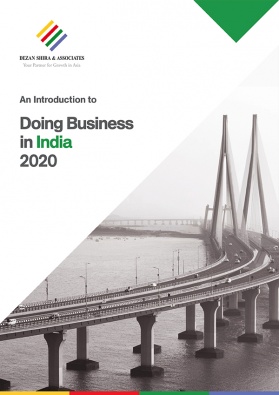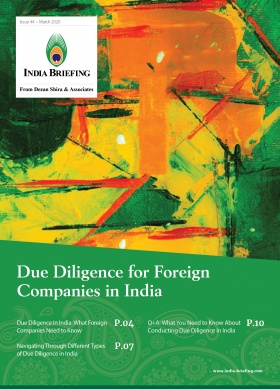India, Italy Partnership to Focus on Advanced Manufacturing of Railways and the Agro-Industry
India and Italy are re-energizing their bilateral investment relationship as New Delhi engages in a rebalancing act with Europe.
Keen to attract foreign investment to its advanced manufacturing industries, India is seeking more diversified investment from Italy, in key sectors. The new areas of focus include India’s railways and agro-industry.
The two countries also witnessed a recent boost in bilateral ties as Fincantieri, the Italian shipbuilding group and Cochin Shipyard Limited (CSL), a leading shipbuilder in India, reached a memorandum of understanding (MoU) targeting India’s naval defense fleet in late October. The MoU includes the design, procurement, and local construction of new vessels as well as naval automation.
India’s investment appeal: Gujarat’s pitch
Most Italian companies based in India have located their operations in established industrial hubs like the capital, Delhi, and Mumbai and Pune in the western coastal state of Maharashtra. Increasingly, however, foreign investors have reason to cast their nets wider when choosing where to locate operations in India.
The state of Gujarat, on the west coast, is among leading Indian states that are pitching their industry-friendly ecosystem to foreign companies. Specifically, the Gujarat government is appealing to companies engaged in agro-industrial projects, which could interest Italian companies in this sector. Gujarat’s Industrial Policy 2020, include the following:
- Financial support to agro-based and food processing projects under the ambit of infrastructure, marketing, and research projects;
- Announcement of new subsidies for industries in the micro, small, and medium enterprise segment (MSME); and
- Announcement of capital and interest subsidies that will boost their growth – based on their location. The categorization of locations is decided by the taluka, which is a local administrative division.
Industrial promotion of thrust sectors
- Core industries, such as industrial machinery, electrical machinery, auto components, food processing, and pharmaceuticals; and
- Sunrise industries (nascent industries that are expected to become essential in the future), such as waste management projects, green energy (solar and wind equipment), and eco-friendly compostable material.
Sectors of interest to Italian firms
India is pushing to expand foreign investor participation in the country to develop its domestic manufacturing capacity, cater to lower tier supplier networks and reduce import dependency, as well as promote technologically advanced segments to move up the global industrial value chain.
Italian investors could consider these factors when planning future projects or relocating their manufacturing operations in Asia.
Traditionally, Italy’s leading brands and multinational firms have concentrated investment in three sectors in India, namely, fashion, defense, and finance. India is now pitching its automotive, engineering, and education sectors, to name a few, for more diversified Italian investment.
What India offers is a vast consumer and labor market as well as the presence of a large number of small and medium-sized industries (SMEs), the latter a predominant feature of the Italian economy as well.
Insights for Italian companies, new investors
Last year, in October, the Embassy of India in Rome launched the Access India Initiative (AII). It was a strategic 12-month program meant to promote bilateral economic relations. The objective was simple – India needs technology and skills that Italy can provide but Italian firms have found it difficult to navigate the Indian SME market.
The AII sought to help Italian SMEs as well as other Italian firms who:
- Were already engaged in import-export operations with India; and
- Wanted to set up production facilities and/or start commercial operations.
Further, a study was conducted by the ICRA Management Consulting Services (IMaCS) to analyze the growth strategies of existing Italian companies and understand their success. This would guide future Italian companies interested in doing business in the Indian market.
The IMaCS study observed that successful Italian investors in India leveraged the Indian market’s strengths; benefitting from steady economic growth, large labor pool and lower production costs, tapping into industrial capabilities and locational advantages, increasing foreign exchange rates, and higher exports due to the diversification of the manufacturing and service sectors.
For example, the Italian automaker, Fiat, one of the world’s largest car manufacturers owes its success in India to a well-established supply chain and attractive domestic market.
Moreover, the growth in investment relations between India and Italy have created the demand for support services. The primary service is banking, which is already beginning to contribute to Italian presence in India. Banco Popolare di Verona and Banco Popolare di Vicenza have set up representative offices to offer services to customers. Services include assisting Italian clients who want to do business in India by way of legal help, investment activity information, and information on business opportunities.
To compete with the presence of many other international companies, Italian companies will have to localize their operations and products to suit India needs. To accomplish this, it is important for companies to have local employees be a part of their decision-making who understand the Indian climate and can effectively contribute to organizing operations and designing products.
Trade and investment opportunities
Bilateral trade between India and Italy has significantly grown in the last 20 years. Italy is among India’s top five trading partners, accounting for trade in volume worth US$11.3 billion in 2019.
There have been two recent achievements: the first in the fisheries sector involving government officials and the representatives of major stakeholders of this sector from both countries; and the second was another collaborative venture on food processing.
In 2019, Italy imported US$143.74 million worth of fish and crustaceans from India.
Italy is also the lead exporter in food packaging and processing equipment. This became an important trade item due to the rise in demand of packaged food items by Indian citizens under the pandemic.
There has also been talk of agreements supporting financial schemes that will increase bilateral investments. The signing of an MoU between the Cassa Depositi Prestiti (CDP) and the National Infrastructure Investment Fund (NIIF) on October 28, 2020, was welcomed by, both, Indian Prime Minister Narendra Modi and Italian Prime Minister Giuseppe Conte.
Foreign direct investment flows from Italy to India are expected to amount to US$2 billion by 2020.
In India, Italian companies are organized into three groups: wholly owned subsidiaries, joint ventures, and commercial representative offices. In total, there are around 400 Italian companies at present in India.
Opportunities can be found in India’s railways, food processing, pharmaceuticals, automobile, and renewable energy sectors. In 2017, the beneficiaries of the highest Italian FDI inflow into India were the automobile sector at 54 percent, railways sector at 4 percent, and services sector at 6 percent.
In recent weeks, India has consolidated its foreign direct investment policy regime and announced production-linked manufacturing incentives in targeted industrial segments. Last year, the country slashed corporate tax rates.
For more information and advice for foreign investors on doing business in India, please feel free to email us at india@dezshira.com.
About Us
India Briefing is produced by Dezan Shira & Associates. The firm assists foreign investors throughout Asia from offices across the world, including in Delhi and Mumbai. Readers may write to india@dezshira.com for business support in India.
- Previous Article India at the Crossroads: The Free Trade Options After Rejecting RCEP
- Next Article Ein Leitfaden zum Mindestlohn in Indien im Jahr 2021










